Barney Wiget's Blog, page 30
January 1, 2020
Changed Hearts Change the World

“Changing the human heart and changing human society are not separate tasks, but are as interconnected as the two beams of the cross.” Henri Nouwen
When Jesus moves in he disrupts our personal ethics and replaces them with upside down ones, but he doesn’t stop there. He saves our souls and through us seeks to save our society. He destabilizes the defective foundation on which modern society is built and substitutes it with sturdier material.
When we say that we aspire to be like him are we just talking about being clean-talking, drug-free, conservative-voting polite citizens or must we have something more in mind?
As we strive toward a more perfect union, lawmakers and the media who frame public issues need the Church to hold them accountable to the sort of eternal values that more adequately reflect Sermon on the Mount values.
“An individual gospel without a social gospel,” said the great 20th century missionary to India E. Stanley Jones, “is a soul without a body, and the social gospel without an individual gospel is a body without a soul. One is a ghost and the other a corpse.”
Splitting the two leads to a warped reading of Scripture and tempts us to domesticate the gospel. Any gospel without feet isn’t the gospel at all.
Although the Bible is not a manual on politics, it does offer us principles that structure our moral reasoning, which in turn affects our politics. Jesus teaches us in this Sermon (and others) to integrate his truth into public life with morally compelling and biblically founded convictions.
Our influence reaches beyond getting people to say a “sinner’s prayer” and sign up for a new believers class. Spirit-saturated subversives function, as we’ll see later, as “salt” to rescue souls and societies from decay and as “light” to illuminate the path to a better humanity.
Here are a few more excerpts from a book I hope to publish in the near future on the Sermon on the Mount called: What In The World? Some Moral, Social, and Politically Disruptive Implications of Jesus’ Sermon on the Mount.
As such, I’d appreciate your feedback on this post and others to come in order to make the final copy publish-worthy.
December 30, 2019
An Ego At Rest

Jesus seeks to destabilize our arrogance and construct a new way of thinking and acting in its place. While religious outwardism crushes the ego, the anti-kingdom outlook coddles it. Jesus offers a third way, one in which the ego can breathe at ease.
Remember that for the “middle-class in spirit” life is their film and the planet is their stage. They get top billing and the rest of us are just playing bit parts in support of their stardom. They might allow even Jesus to play a small part in their story, but they get the credit and everyone, including him, just read off the script they’ve written. They intend to “inherit the earth” without any assistance from above.
The ego of the meek, on the other hand, is an ego at rest. It’s not haughty or hungry for praise. It’s not restless or demanding, nor does it clamor to be spoon-fed with “atta-boys.” It’s content.
This is an excerpt from a book I hope to publish in the near future on the Sermon on the Mount called: What In The World? Some Moral, Social, and Politically Disruptive Implications of Jesus’ Sermon on the Mount.
As such, I’d appreciate your feedback on this post and others to come in order to make the final copy publish-worthy.
December 27, 2019
The Heart of the Matter

The Sermon on the Mount insists on an inside-out approach. Only the Sermon’s Preacher and those within whom he resides can practice what he preaches. The only way to live upside down is to live inside out. Jesus sits in the control center prompting outlandish individual and social behavior.
Exterior-only religion downplays or altogether discounts the innermost part of us. The human spirit is left out of most “Christian conversations” about what it means to be human.
God designed the whole of us and has designs on all of the parts of the whole; wherein spirit, soul, and body (1 Thessalonians 5:23) are all in play. Trying to live like Jesus by simply denying the body and disciplining the soul, thus leaving our spirit almost entirely out of the process, is a sweaty business. But Jesus made it possible for God’s transforming power to inwardly invade us so that our innermost parts influence our outermost parts.
This is an excerpt from a book I hope to publish in the near future on the Sermon on the Mount called: What In The World? Some Morally, Socially, and Politically Disruptive Implications of Jesus’ Sermon on the Mount.
I’d appreciate your feedback on this post in order to make the final copy as faithful as possible to the message of Jesus.
December 18, 2019
A Foot-Washing Troublemaker

Jesus, our prototypical Subversive, was a culture-changing, foot-washing troublemaker! Instead of royal symbols of sword and chariot he chose a servant’s basin and towel. He had all the power of heaven at his disposal, but rather than vaunting himself to dominate, he bent low to wash the feet of those who should’ve been washing his. The irony of the “meek” inheriting the earth is the essence of Kingdom disruption. He disrupts the top-down system from the bottom up.
He then passes the basin and towel on to us to disrupt our social order with the same spirit of servanthood. By selfless servitude he subverts the conventional wisdom of the world and requires us to do the same. As servant subversives we don’t grope for power, attempt to control reality, or expect the world to understand us, let alone serve us. We love them past their insults and threats and continue to sow seeds of justice and mercy.
“Newness happens in the world,” says Walter Brueggemann, “when long silenced people get their voice enough to sing dangerous alternatives.”
These are excerpts from a book I hope to publish in the near future on the Sermon on the Mount called: What In The World? Some Moral, Social, and Politically Disruptive Implications of Jesus’ Sermon on the Mount.
As such, I’d appreciate your feedback on this post and others to come in order to make the final copy publish-worthy.
December 16, 2019
An Inside Out Kingdom
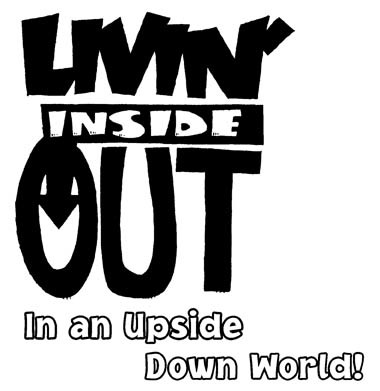
“Be changed from the inside out. Readily recognize what he wants from you, and quickly respond to it.” Romans 12:2 (The Message Version)
I’m both enamored with and terrified by Jesus’ audacious ethic. His Sermon contains some of the most fetching words ever spoken and at the same time the most unachievable to live under human steam. Love your enemies, do something good for the person cursing you, and do it without telling anyone you did it seems pretty out of reach to me!
If you want to be “blessed” be poor, be sad, be meek, be hungry, be persecuted! His is a Kingdom of surprises. As he shatters socio-spiritual stereotypes he lures us into trusting him for assistance.
Jesus’ way of life was so nonsensical that most of his contemporaries thought he was just the newest crank in a long line of cranks. Undeterred, he determined that his upside downness would not end with him. He would perpetuate it in and through those brave enough to follow him. Given our predisposition toward conforming to cultural norms his proposition is nothing less than preposterous.
Therefore the only way for creatures so bent on our own preferences to practice his way of holy nonconformity is from the inside out.
This is an excerpt from a book I hope to publish in the near future on the Sermon on the Mount called: What In The World? Some Moral, Social, and Politically Disruptive Implications of Jesus’ Sermon on the Mount.
As such, I’d appreciate your feedback on this post and others to come in order to make the final copy publish-worthy.
December 13, 2019
The Upside Down Kingdom

“These who have turned the world upside down have come here too. Jason has harbored them, and these are all acting contrary to the decrees of Caesar, saying there is another king—Jesus.” Acts 17:6-7
We who make our feeble attempts to emulate Jesus are viewed by the upside down culture as the upside downers. It’s a matter of perspective. God’s ways, especially those described and prescribed in the Sermon on the Mount, are only “upside down” in proportion to a culture that thinks of itself as “right side up.”
I heard that in the science of the human eye the image projected on our retina is upside down. I guess our brain compensates for it somehow and makes everything come out right. It doesn’t really make a lot of sense to me, but since smarter people than me say it, I’ll buy it. Maybe God’s perspective in contrast to ours works that way.
We call Jesus’ way the “upside down” way only because it appears so in contrast to the way we commonly conduct ourselves. It’s so contrary to logic and human nature it appears upside down. Appearances notwithstanding, this is the way God meant for our highest functionality from the beginning. Any other way is unnatural and corrosive.
Jesus shattered stereotypes and upended norms. Peter Maurin, the eccentric cofounder of the Catholic Worker movement, said: “If I am crazy, it’s because I refuse to be crazy in the same way that the world has gone crazy.” Likewise, Paul the Apostle called himself a “fool for Christ.”
This is an excerpt from a book I hope to publish in the near future on the Sermon on the Mount called: What In The World? Some Moral, Social, and Politically Disruptive Implications of Jesus’ Sermon on the Mount.
As such, I’d appreciate your feedback on this post and others to come in order to make the final copy publish-worthy.
December 11, 2019
Why I Talk So Much About Politics

In response to something I wrote recently, a friend of mine, wrote this to me:
“For Christ-followers to get worked up over politics, is to fall right into the devil’s scheme to make us ineffectual in our faith. Some of us are called to enter the political arena (or have come to faith while serving in gov’t) in order to wield kingdom influence. But I believe that it is very misguided to believe that we should try to generate enough political clout to pass laws designed to make ‘sinners’ behave. Jesus’ strategy for changing the world was disciples making disciples. People with changed hearts don’t need political solutions.”
In that this seems to be a conviction of many of my fellow followers of Jesus, I thought I’d share a few of my random thoughts on the intersection of faith and politics. There are many other things to be said about this controversial topic, but let me offer a these for now.
Historically when politics and faith have gotten into bed together they’ve given birth to “disabled offspring.” That is, fusing faith with politics creates politicized religion or religionized politics, a disaster for both religion and politics. In other words, while it is problematic when these two entities to have intercourse, there’s no doubt that they will inevitably intersect. When and where they do, it’s our faith that should govern the way we respond politics, not the other way around. Both the world and the Church suffer when we sequester Jesus behind stained-glass and quarantine his followers away from sociopolitical engagement.
Most political issues have moral implications, and since we derive our morals from Jesus, we can hardly stay quiet when something he cares about is at stake. Fighting for justice for those who are oppressed is as important a responsibility of our faith as developing strong personal piety. The divide between our personal morality and political morality is fabricated. We vote for the kind of society Jesus wants or we don’t.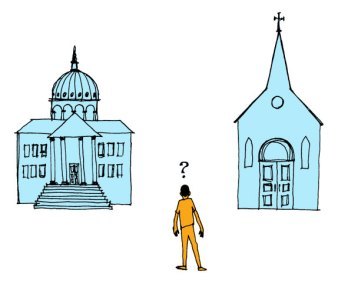
While committed to separating Church from State, we mustn’t segregate our moral values from public life. “Those Christians who try to avoid all political discussions and engagement are essentially casting a vote for the social status quo,” says Timothy Keller. “Since no human society reflects God’s justice and righteousness perfectly, supposedly apolitical Christians are supporting many things that displease God. So to not be political is to be political.”
It’s political when we say that “Jesus is Lord,” because at the same time we’re saying that Caesar is not. It is in that sense that the Church is a political community. “You can’t be indifferent to politics,” says Peter Wehner, “because politics is about human lives, and if you get your politics wrong there’s a huge human cost. And if you get your politics right, you can create the conditions for human flourishing and human dignity.”
I think, using that framework, it’s a mistake to claim that Jesus or Paul weren’t political. They both affirmed the second greatest command to love our neighbors, which includes both friends and enemies. We have a responsibility to stand in opposition to any political policy that obstructs our neighbors’ right to shalom. And presumably we would hope our neighbor felt the same way about standing up for us if our shalom was being obstructed.
Thomas Jefferson made the same point about politics and government when he said: “The care of human life and happiness and not their destruction is the only legitimate object of good government.” That sounds awfully like what Jesus said about loving our neighbors.
It’s interesting to me that Christians, who have no difficulty advocating, if not participating in, marches and rallies for the unborn, argue against church folk involving themselves in other political initiatives. They’ll write to lawmakers opposing gay marriage, insisting that their representatives rule a certain way on transgender bathroom facilities, or disputing tax increases (for their own economic bracket). But when it comes to other issues they refuse to speak up on the basis that “Christians and politics don’t mix.” That seems duplicitous to me.
I agree that they don’t “mix” but they do often intersect, and when they do, on the basis conscience, we have the right (especially in our democratic system) and the obligation to represent the position we consider to be most in keeping with Christ’s kingdom. Lawmakers and media who frame public issues need the Church to hold them accountable to the sort of eternal values that Jesus teaches.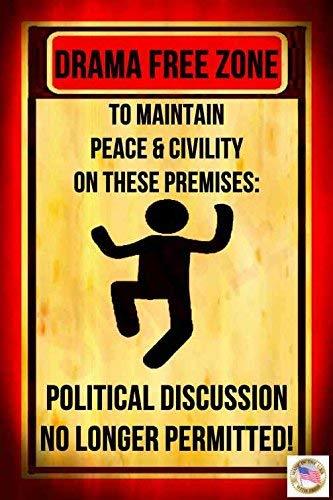
I certainly respect that believers will not be able to address every social issue that is in conflict with the will of God. No one has the time or the Spirit’s leading for that. But to argue that political engagement is somehow a distraction from our faith doesn’t make good sense. To fail to somehow address those particular anti-kingdom issues that the Spirit is highlighting for us personally is in my opinion a seriously mistaken notion.
The best social movements have historically had spiritual foundations. Abolitionism, women’s suffrage, the institution of child labor laws, changing Jim Crow laws, erasing apartheid, were all fueled predominantly by people of faith who weren’t afraid to engage in politics on some level. Most of these people were unsung allies of those whose names of whom we’re more familiar. King, Wilberforce, Mandela, Tutu, and others couldn’t very well institute political change apart from their spiritually motivated multitudes of partners in crime. It’s a good thing that those lesser knowns didn’t take the view that political involvement is somehow separate from obedience to Christ. Otherwise, many of these unjust systems might still be in place.
We place our faith in God not in politics, but when the will of God and his just kingdom intersect we must, as did the prophets, align ourselves with him in prayer, speech, and action.
Therefore, I can’t see how that political engagement is “fall(ing) right into the devil’s scheme to make us ineffectual in our faith.” It seems to me that many Christians are so afraid that they’ll lose track of their faith if they concern themselves with politics that they surrender their prophetic responsibility to bring their faith into the public square. Politics is simply how we apply our faith and moral values to public life. It’s my faith that compels me to speak truth about power, and when necessary, in the name of Jesus, follow his example and turn the tables on the injustices that disadvantage my neighbors.
“Politics is certainly not a place for the pursuit of utopia and moral perfection;” says Peter Wehner, “rather, at its best, it is about achieving the best approximation of the public good, about protecting human dignity and advancing, even imperfectly, a more just social order.”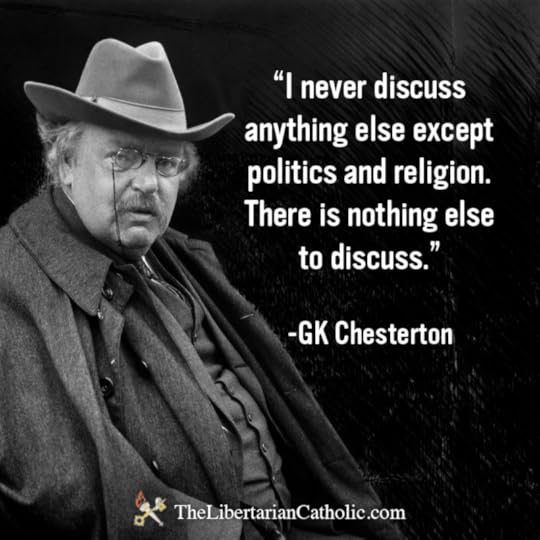
Contrary to my friend’s statement, we do pass laws to “make sinners behave” all the time––laws against murder, theft, rape, child porn, driving under the influence, etc. We legally require tax paying, minimum wages, and licenses to drive. We have laws requiring us to stop at stop signs, to drive the speed limit, and to use our blinkers when we turn. And if we sinners don’t behave that way we pay a fine or go to jail. Just laws are simply man-made codes that square with the law of God.
My friend said that “people with changed hearts don’t need political solutions.” It’s a snappy meme, but it makes no sense. Many of the African slaves became Christians and had “changed hearts” along with oppressed bodies until the law was changed by people of conscience and good will. Again, since 1973 pro-life Christians have worked hard to get Roe v. Wade changed. Having a changed heart is no replacement for political solutions. In fact, my new heart (now 47 years old) yearns for many changes in our society that my old heart had no concern for.
Many of us live lives that are comfortable enough to be untouched by politics. It’s easy for those of us who have a lion’s share of social privilege to minimize the value of political engagement. We simply need very little that we don’t already possess socially. Refugee quotas, welfare systems, or how much money is put into inner city schools does not affect us. We can do what we want, go where we want, and educate our kids in pretty much whatever schools we want. In one of his poems T. S. Eliot wrote: “It is hard for those who live near a Police Station / To believe in the triumph of violence.”
We can wash our hands of politics, and turn away from our poor neighbors. We can insulate ourselves from the needs of the world and make our faith a private, individual affair. “Those who devalue the importance of politics tend to be those who live in luxury and safety, where systemic injustice is a distant reality, unseen and unfelt by those living in comfortable neighborhoods,” says Peter Wehner.
We will disagree at times, but we must remember that the Jesus we share is more important than the politics that we don’t.
I recommend these two books on the subject of intersection of faith and politics:
The Death of Politics: How to Heal our Frayed Republic After Trump by Peter Wehner
Good and Bad Ways to Think About Religion and Politics by Robert Benne
Onward: Engaging the Culture Without Losing the Gospel by Russell Moore
December 9, 2019
The Best Possible Preview
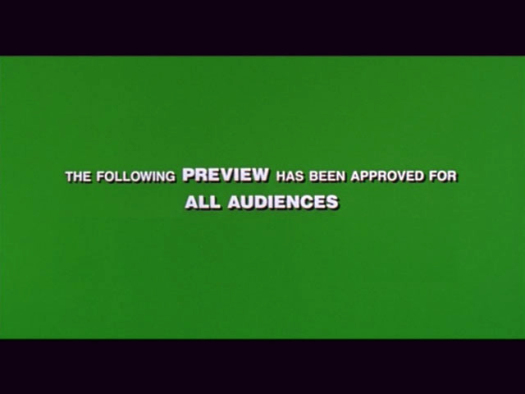
When Jesus said his Kingdom is not of this world, he didn’t mean it had no place in this world. In eternity Jesus made heaven, inhabited its perfections, and ruled supreme there. In history he came to earth to show us what perfection looks like and taught us how to emulate him while living here as citizens both of earth and of his home country.
Our job is to provide the best possible preview of the future when Christ will return and reign as King over a new heaven and earth. After all, more times than not, Jesus calls his Kingdom the “Kingdom of Heaven,” and then teaches to pray and act for this Kingdom that permeates heaven to invade the earth.
Just as a good movie’s preview makes you want to go see the rest of it, we are tasked with demonstrating what we can imagine from Scripture of the heavenly reign of Jesus in hopes that people will accept the invitation to come for the rest of the show and partner with us to make a better and better preview for all the world to see.
This is an excerpt from a book I hope to publish in the near future on the Sermon on the Mount called: What In The World? Some Moral, Social, and Politically Disruptive Implications of Jesus’ Sermon on the Mount.
As such, I’d appreciate your feedback on this post and others to come in order to make the final copy publish-worthy.
December 7, 2019
It’s Demonic!

I don’t know if you were aware that we have Eric Metaxas and Franklin Graham to thank for clearing up where all this impeachment talk comes from. The devil made ’em do it!
Peter Wehner does a much better job than me taking exception with their assertion, so feel free to skip this and go right to his article in the Atlantic. Wehner is both a devoted follower of Jesus and an expert political pundit. As just one of those (the Jesus one), I’m compelled by conscience (and I think by the Spirit) to comment on this rash and biblically baseless claim that demon powers account for those who challenge Mr. Trump’s fitness for the job of president. I can’t just sit back and let their comments go unchecked.
For the record, I consider these two men to be my brothers in Christ. I can’t wrap my head around their determined devotion to Donald Trump, but I am hardly in a position to question their commitment to Christ. I would never say of them what they seem to be saying about those who disagree with them––that their views are demonically induced.
I do think they, and the entire cadre of otherwise intelligent Christian leaders who vociferously claim that the emperor is fully clothed and should be cheered for his choice of attire, are profoundly mistaken and must wake up out of their delusion lest the reputation of the Body of Christ in America be impaired for decades.
Giving them the benefit of the doubt, though foolishly playing the demonic card, neither said that anyone in particular is personally demonized for objecting to what the president stands for. Metaxas was saying how bizarre it is that people fight so hard against POTUS when Graham chimed in and claimed that it was “almost a demonic power…” Metaxas then interrupted and upped the anti: “It’s not almost demonic…” Who knows where Graham was going with it had he not been interrupted, but they both agreed that there is a demonic power influencing the call to impeach the president.
I believe that a real battle with real hellish spiritual forces exists. The Bible is replete with references to the dark powers and how they influence individuals and collections of individuals called nations. But as Wehner says, “There is no biblical or theological case to support the claim that critics of Donald Trump are under the spell of Satan. It is invented out of thin air, a shallow, wild, and reckless charge meant to be a conversation stopper.”
Side note: Just today a friend sent me a podcaster’s video soliciting prayer for the president based on this very thing. He claims that the attacks on Donald Trump by “communists, socialists, and liberals in this country” are being initiated by the adversary of our souls. That’s a pretty broad brush I’d say––with “demons” and “liberals” painted into the same corner! So, everyone who disagrees with the president is a demon possessed communist? Back to Graham and Metaxas…
“[They] appear to believe that they, along with Donald Trump, are part of a holy crusade to rid the world of evil, wickedness, and demonic powers,” says Wehner. “What they are saying in their interview is that you either stand with them, or you stand with the forces of Satan. There is no middle ground.”
It’s demonic. End of discussion!
Where’s the room for any exchange of rational ideas?
My biggest concern about this sort of talk by Christian leaders in such a public forum is the affect it has on the watching pre-Christian community. It’s not like they didn’t already have good reasons to stay away from the Church. Millennials and younger aren’t stupid. They can see the hypocrisy of a Church that preaches integrity, compassion, and love of enemies and then goes ahead and sanitizes a man who exhibits none of those qualities. They’re not ignorant of the fact that Donald Trump is intellectually, temperamentally, and morally unfit to be mayor of a small city, let alone president of the United States. And yet those dumb Christians call him “the chosen one!” They can see his unique skill at conspiracy peddling, while at the same surrounding himself with Evangelical water-carriers and photo-op cravers. They know he compulsively lies, is vindictive, erratic, and ignorant of how world leaders interact with each other. Then they read Jerry Falwell Jr.’s claims that Mr. Trump is “a Churchillian figure…one of the greatest visionaries of our time … who lives a life of loving and helping others as Jesus taught in the New Testament.”
No wonder they wonder what we’ve been smoking!
I couldn’t agree more with Wehner: “They make the job of the so-called New Atheists so much easier than it would otherwise be. All militant atheists need to do is to point people—young people in particular—to conversations like the one between Graham and Metaxas and say, ‘Is that the kind of faith you want to be associated with?’”
“Everything exposed by the light becomes visible—and everything that is illuminated becomes a light. This is why it is said: “Wake up, sleeper, rise from the dead, and Christ will shine on you.” Be very careful, then, how you live—not as unwise but as wise, making the most of every opportunity, because the days are evil.” (Ephesians 5:13-16)
December 6, 2019
Heaven Shares its King

Jesus uses “Kingdom of Heaven” over and over to describe a way of life that is transplanted from heaven to earth. It’s not just a Kingdom in heaven, but the Kingdom of heaven wherein he injects the life of heaven in willing earthly subjects. He gradually grows that life inside them, and then, through them plants it like seeds throughout the earth. His Kingdom exists in heaven and, before heaven finally descends on earth in its totality, he kneads it into the earth through kingdom people.
When Jesus made his earthly appearance he brought with him a whole new spiritual and social possibility, one in which all people are honored equally instead of sorted into classes, where enemies are loved, where resources are generously shared, and where power is put in the hands of the meek.
When Jesus sets up his headquarters inside us, relationships, households, economies, governments, and every feature of culture begin to lean toward heaven’s standard. God’s new social order infiltrating earth produces improved image bearers, healthier families, socially conscious business models, and governments that offer liberty and justice for all.
God’s saving grace, which transfers us from one bad kingdom to the best of all kingdoms, remakes us in his image and reforms the world around us. Establishing a shalom-shaped community requires the same divine power as saving an individual from his or her sin and selfishness.
This is an excerpt from a book I hope to publish in the near future on the Sermon on the Mount called: What In The World? Some Moral, Social, and Politically Disruptive Implications of Jesus’ Sermon on the Mount.
As such, I’d appreciate your feedback on this post and others to come in order to make the final copy publish-worthy.



